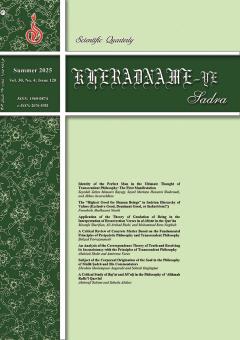Application of the Theory of Gradation of Being in the Interpretation of Resurrection Verses in al-Mīzān in the Qur’ān
Subject Areas : Studies on Sadrian philosophers and commentators and critics of Mulla Sadra
Mostafa Sharifian
1
![]() ,
Ali Arshad Riahi
2
,
Ali Arshad Riahi
2
![]() ,
Mohammad Reza Naghieh
3
,
Mohammad Reza Naghieh
3
![]()
1 - PhD Candidate of Transcendent Philosophy, Department of Islamic Philosophy and Kalam, University of Isfahan, Iran
2 - Professor at the Islamic Philosophy and Kalam Department, University of Isfahan, Isfahan, Iran
3 - Assistant Professor, Department of Islamic Education, Isfahan University of Medical Sciences, Isfahan, Iran
Keywords: ‘Allāmah Ṭabāṭabā’ī, gradation of being, resurrection verses, philosophical interpretation, al-Mīzān,
Abstract :
This paper aims to examine the role of the philosophical theory of “gradation of being” in the interpretation of Qur’ānic verses related to resurrection in Tafsir al-Mīzān. Here, the basic hypothesis is that the theory of gradation and its philosophical concomitants have exercised a serious and pervasive influence on the interpretation of these verses. To prove this hypothesis, the authors have, firstly, collected and categorized the instances of the application of the theory of gradation in the interpretation of verses on resurrection. Then, they have explained the quality of the application of this theory and its role in the interpretation of the related verses. Finally, they have concluded that, relying on this theory, ‘Allāmah Ṭabāṭabā’ī has used the various divine attributes mentioned in such verses to interpret the truth of resurrection and the sequence of otherworldly events, explain the system of afterlife, and describe the relationship between the worldly realm and the realms before and after it. Some of the results of applying the theory of gradation include the systematic interpretation of fundamental concepts related to resurrection, such as witnessing, intercession, ascension, divine proximity, felicity and wretchedness, as well as deciphering the reality of returning to God and the nature of otherworldly life and explaining the criteria for degrees and levels in afterlife. This study demonstrates the harmony and reciprocal relationship between religious and philosophical theorems and refutes the separation of the teachings of the Holy Qur’ān from philosophical findings.
قرآن کریم، ترجمة محمدمهدی فولادوند.
ابراهیمیفخاری، آزاده؛ رستمیان، محمدعلی (1399) «قواعد فلسفی و چیستیشناسی توحید ربوبی در تفسیر المیزان»، آینه معرفت، دورۀ 20، شمارۀ 2، ص52ـ39.
طباطبایی، سیدمحمدحسین (1387الف) اصول فلسفه رئالیسم، قم: بوستان کتاب.
طباطبایی، سیدمحمدحسین (1387ب) انسان از آغاز تا انجام، ترجمه و تعلیقات صادق لاریجانی، قم: بوستان کتاب.
طباطبایی، سیدمحمدحسین (1387ج) مجموعه رسائل، قم: بوستان کتاب.
طباطبایی، سیدمحمدحسین (1430ق) المیزان فی تفسیر القرآن، قم: ذویالقربی.
طباطبایی، سیدمحمدحسین (1427ق) نهایةالحکمة، قم: مؤسسه نشر اسلامی.
عبودیت، عبدالرسول (1389) درآمدی به نظام حکمت صدرایی، تهران: سمت.
عبودیت، عبدالرسول (1387) فلسفه مقدماتی (برگرفته از آثار استاد شهید مطهری)، قم: مؤسسة امام خمینی (ره).
فنایی اشکوری، محمد؛ با همکاری جمعی از نویسندگان (1390) درآمدی بر تاریخ فلسفه اسلامی، تهران: سمت.
کرد فیروزجایی، یارعلی (1396) حکمت مشاء، قم: حکمت اسلامی.
مصباحیزدی، محمدتقی (1405ق) تعلیقة علی نهایةالحکمة، قم: مؤسسة در راه حق.
مطهری، مرتضی (1383) مجموعه آثار، تهران: صدرا.
مطهری، مرتضی (1388) مقالات فلسفی، تهران: صدرا.


